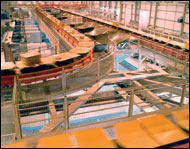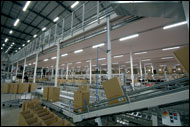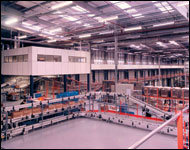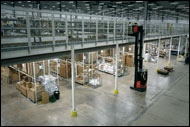 The ISO9001 registered British firm Mezzanine International Limited designs, manufactures and installs mezzanine floors, platforms and structures to support conveying and other automation equipment, individually designed for specific applications for customers mainly in the UK and mainland Europe but also as far afield as South America. Its single or multi-level mezzanines can be found in warehouses, distribution centres, cold stores, manufacturing plants, airports, offices and retail units – wherever the need exists for clients to ensure better use of space to save money and increase profitability.
The ISO9001 registered British firm Mezzanine International Limited designs, manufactures and installs mezzanine floors, platforms and structures to support conveying and other automation equipment, individually designed for specific applications for customers mainly in the UK and mainland Europe but also as far afield as South America. Its single or multi-level mezzanines can be found in warehouses, distribution centres, cold stores, manufacturing plants, airports, offices and retail units – wherever the need exists for clients to ensure better use of space to save money and increase profitability.
Currently the fastest growth area of Mezzanine International’s business is the provision of support structures for conveyors and sortation equipment mainly used in “big shed” warehouses and distribution centres, in new generation parcel sortation facilities and in airport facilities supporting baggage handling conveying systems, all to avoid the disruption that conveyors can cause to traffic flow on main floor levels. John Porter, a Director of Mezzanine International Limited, spoke to Warehouse & Logistics News.
Warehouse & Logistics News – When was Mezzanine International founded, and who by? Are they still involved? Who owns the company now?
Mezzanine International Limited was founded in 1991 by three of the current Directors, myself, Keith Loveday and Richard Ventin. All are still involved in the day to management of the company.
WLN – How big is Mezzanine International in turnover and staff numbers now? Where is it based? What proportion of your work is outside the UK?
We currently expect our 2008 turnover to be around £6 million, with around 25% being export. Our offices are based in East Peckham in Kent, which is between Maidstone and Tunbridge Wells. We currently have a full-time workforce of 19 employees, who all work out of our Kent office.
WLN – When did you (John) join the company? How has the business changed in your time?
I was one of the founders of the company. When we first started we were heavily involved in manufacture and employed our own steelwork installation teams. To remain competitive we now target our energies to our area of maximum expertise, the design of mezzanine structures. Whilst this may sound limiting, our manufacturing workforce is now effectively ten-fold in comparison with our previous fixed capability, which enables us to compete within our chosen market sectors to a much greater extent than in former years.
WLN – What is your role in the company now? Do you (John) head up the customer relationships? Who heads up the technical side? Are you involved in new business and with contracts once they come on board?
As with most small companies, management has to paint with a very broad brush, however I am mainly involved in design and sales. Our design team comprises a group of four technicians headed by Robert Card. Our sales team of four including myself look after the five sectors of business that we deal with on a day today basis.
 WLN – Which sectors are those?
WLN – Which sectors are those?
Those five sectors are companies dealing with systems integration and sortation and distribution projects: management contractors dealing with fit-outs of new distribution centres: large and complex projects for blue chip companies such as major retailers: companies involved in storage equipment and materials handling projects who purchase mezzanines as part of a project: and small and medium sized mezzanines for end users. I find myself dealing with all five sectors of our business day by day.
WLN – Where are your support structures and mezzanine floors made? Where is the design work carried out?
We carry out all the design work for our mezzanines and other structures at our offices here in Kent. Once a design is approved, using the special software that we have, fabrication drawings and call-offs are automatically produced from our approved general arrangement drawing and our production department analyse the fabricator best suited for each project and place contracts with the individual companies concerned. With large projects, often three or four different fabricators and service providers can be employed during the manufacture of our product.
WLN – What size of companies do you supply mezzanine floors to? Do you supply related services like flooring, piping, electrics, lighting and carpeting?
We have carried out projects ranging from a few hundred pounds to well over £4 million sterling. We tend to try to restrict our business to areas where we have a regular involvement. We have been involved in providing lighting and other electrical services on or under our mezzanines, but this is more likely to be more economically provided by a local specialist.
WLN – If you can summarise your pitch in a few words, why build a mezzanine floor or conveyor support structure from Mezzanine International?
We are ahead of the competition because of the depth of knowledge and experience within our team, which is second to none.
WLN – What proportion of your business is conveyor support systems?
Conveyor support mezzanines are the fastest growing part of our business, accounting for 45% of our business, up from under 5% ten years ago. This growth has been driven by the high cost of human resources within Western Europe.
 WLN – What sort of conveyor support projects do you carry out?
WLN – What sort of conveyor support projects do you carry out?
We provide structures to support small carton, case or tote conveyors, powered pallet conveyors, monorail pallet vehicles and even car body conveyors. With these projects, we are normally working for the conveyor manufacturer or designer. These types of structures have meant that we have had to learn to operate within the strict confines of working at heights of up to 30 metres.
WLN – What’s driving the growth of this side of the business?
I believe the economics of the costs of human resources are continuing to drive the growth of automation in warehouses. High land costs have obviously made multi-level structures in high buildings an attractive prospect to developers.
WLN – Speaking of big sheds, what ongoing projects are you working on?
We have a number of large multi-level projects being installed in Spain this year, more often than not in chill or cold stores. We also have major projects in hand at major supermarket chains. We are currently installing a very complex pallet conveyor level pick and drop conveyor, which involves having to crane all materials over a mono-rail pallet conveyor.
WLN – What market sectors are these projects in? Can you talk about them?
A lot of our integrator customers prefer us not to mention their clients’ names. I respect their request in this, but you do not have to be a professor to know who the major supermarket chains are!
WLN – Have you been doing any conveyor support work for the baggage handling operations at Heathrow Terminal 5?
We, unfortunately perhaps, lost out on the steelwork for the Heathrow T5 Phase 1 baggage handling system. On the face of it that may not be such a bad thing. We are currently quoting for the next phase, and will let you know if we are successful.
 WLN – Your overseas work has been growing strongly overseas in recent years. Can you tell us about that?
WLN – Your overseas work has been growing strongly overseas in recent years. Can you tell us about that?
The pound has fallen by almost 20% in recent months. From a very high level of business in 1995, the weakness of the Euro made us rather uncompetitive until early last year when the fall in the value of the pound started us on a new round of overseas advances. Our business in Spain has doubled each year for the last two years.
WLN – Which overseas countries do you work in?
We have an agent who works for us in Germany and sellers/distributors in France, Belgium, Holland, Norway, Denmark, Sweden, Germany and Austria. We anticipate around 25% of our business this year to be export, growing to 35-40% in 2009.
 WLN – What planning permission do you need for Mezzanine floors?
WLN – What planning permission do you need for Mezzanine floors?
In the UK, mezzanine floors are deemed to be “elements of structure” in our Building Regulations and thus require building regulation approval. More often than not, we deal with this process on our clients’ behalf. This is a very complex area, which must be dealt with professionally to avoid the pitfalls of non-compliance! As with most areas of UK law, ignorance is no defence. On the European mainland, each country has local rules that govern what can be installed as a mezzanine in a workplace, but it is frequently the responsibility of the buyer of the mezzanine to specify what is required.
WLN – How does the design process work?
Following receipt of our site survey, our design office takes the project through to Building Regulation approval itself or supplies clients with complete information to take control of this matter themselves, if that is their preferred route. Our design office is highly experienced in all aspects of mezzanine floor and support structure design, and structures with spans of over 20 metres are within our design and production capability. We ensure state-of-the-art structure design, using the latest versions of AutoCad and Xsteel software, and commonly supply drawings and information to clients electronically.
WLN – What technical standards do your structures comply with?
Currently steelwork design in the UK and other EC countries must be in accordance with local norms, such as BS 5950, DIN 18800 and CM 66, the three we most often have to use. By 2012 at the latest, EC3, a pan European code with local annexes must be used. We have already installed a large structure for postal sortation in France to EC3.
WLN – How important is health and safety in your business?
Health & Safety is a vital part of our design, manufacturing and installation processes. The installation Health & Safety paperwork is used rather too often for my liking, as a defence against the possible consequence of human error accidents in construction sites. You would be amazed how invisible “main contractors” become once risk assessments and method statements have been handed over and work commences. It is almost as if they wash their hands of these matters once the boxes have been ticked!
WLN – How are you geared up to cope with the logistics of delivering large projects?
We have the capability of doing our own manufacturing of our mezzanine floors, plant platforms and conveyor support structures, utilising the wide variety of UK and Continental sections available. As mentioned, we can supply beam spans up to 20 metres. We pride ourselves not only on good lead times but, more importantly, on delivering our structures on time. On larger projects our production unit is aware of the necessity of a regular flow of materials to site, in the required order, to ensure the agreed build programme is maintained. Similarly, on smaller projects, keeping to agreed delivery dates is vital in ensuring projects are completed when promised and that the client’s business is not adversely affected.
WLN – What is your installation capability?
Our installation teams are professional and extremely experienced. Whether the project is a simple storage mezzanine or a complex multi-level structure, our installers have a body of experience gained on projects throughout the UK and Continental Europe. Overseen by a contracts director and contracts managers, our priority is for a safe build programme in accordance with the agreed timescale. We undertake installations during normal working hours; at nights; over weekends; in cold room environments; and sometimes in uncomfortably high ambient temperatures.
WLN – How often should your installations be inspected and who is authorised to do it?
Steel structures, such as mezzanines, should be inspected frequently, especially for collision damage by forklift trucks. In the UK, the BRE/DETR Digest 437 – Industrial Platform Floors, states that annual condition surveys must be undertaken, probably requiring a structural engineer. I am not aware of any such inspections that have not been preceded by an accident in the site concerned.
WLN – What is the working lifespan of your structures? How easily reconfigured are your conveyor support structures as clients’ operations change and evolve?
I am aware of fully functioning mezzanines that we installed over 30 years ago. It is comparatively easy to upgrade and alter existing structures, but this can be difficult in a working site and thus expensive.
WLN – Have you won any awards for export or technical achievement?
We won a Queens Award for export achievement in 1995.
 WLN – Finally, where do you see Mezzanine International going from here?
WLN – Finally, where do you see Mezzanine International going from here?
Our order book is currently very healthy with UK and export projects. I expect a slight fall in the level of our UK business as neither we nor our clients are immune from the current state of the global economy. However, our export business is showing very strong growth and who knows, we may try for a Queens Award again.
Mezzanine International Ltd
Tel: 01622 872871
www.mezzanine.co.uk




Comments are closed.